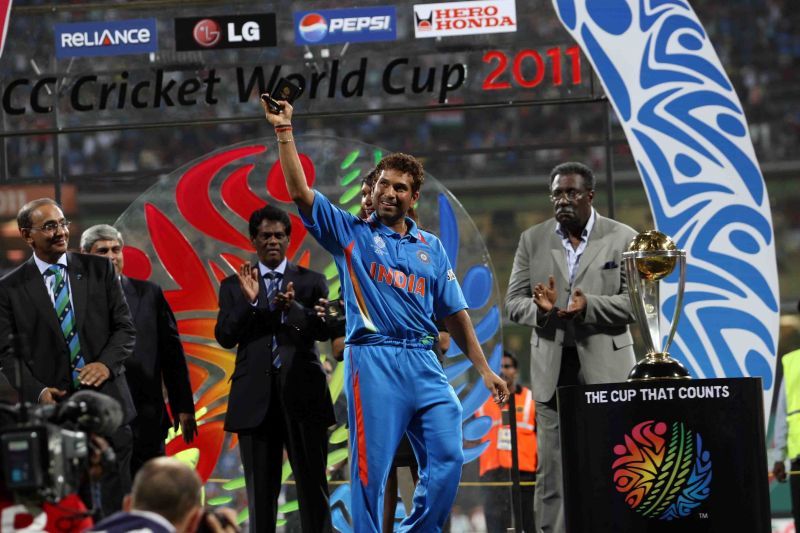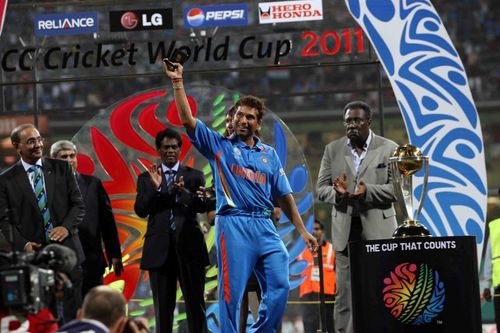
SK Flashback: Sachin Tendulkar reaches the pinnacle at World Cup 2011

There were huge expectations that the Indian team would wrest the World Cup on home turf in 2011. The little genius Sachin Tendulkar was already the highest run-getter in the premier event; he had been the most prolific scorer in the 1996 and 2003 tournaments. In 2003, he not only won the Golden Bat as the player-of-the-tournament, but also racked up 673 runs, the highest in any World Cup.
The opening fixture against Bangladesh at Mirpur was billed as a revenge encounter, in response to India’s shock defeat at the 2007 World Cup. More than anything, the Indian team would have been looking to start their campaign on the right note.
Virender Sehwag ensured just that with a boundary off the first delivery of the tournament. Tendulkar too was off to a splendid start, clipping his second ball for a four on the leg-side.
The pair was cruising effortlessly, raising 50 in the 9th over. Disaster struck soon though, as Tendulkar was run out for 28, having played 29 balls and hit four sweetly timed boundaries. He had helped raise 69 in 10.5 overs.
Sehwag and youngster Virat Kohli hit centuries and India notched up an eagerly-sought victory.
While Sehwag chanced his arm at the English bowling in a crucial game at Bangalore, Tendulkar was in exquisite touch. The two put up 46 before Sehwag was caught behind in the 8th over.
As Tendulkar unleashed his full array of shots, his 134-run partnership in 21.5 overs with Gautam Gambhir set up the match for India. Yuvraj Singh next allied with the little master, who brought up his fifth World Cup hundred in style, having squared up to 103 balls.
In his attempt to further raise the tempo, Tendulkar was dismissed for 120. His brilliant 115-ball innings was embellished with 10 fours and 5 sixes, and his partnership with Yuvraj realized 56 runs in 8.4 overs.
At 236 for three in 38.2 overs, Tendulkar had provided India with a tremendous platform to pile up a huge score. But the later batsmen disappointed, even as Tim Bresnan bowled brilliantly to capture five for 48, and India were bowled out for 338 inside 50 overs.
The England captain Andrew Strauss then played a magnificent innings of 158, and the match ended in a nail-biting tie off the last ball of the match.
There were two successive games against the associate members, and Tendulkar got off to starts without putting up big scores on each occasion. Ireland could muster a total of only 207, and India too lost early wickets before Kohli helped Tendulkar add 63 for the third wicket.
Tendulkar was going well, having hit four boundaries, when he was out leg-before sweeping a straight one. His 38 came off 56 balls, and India went on to clinch the match by five wickets.
Netherlands set an even lower target of 190, and this time the Indian openers got off to a blazing start. Tendulkar fired three boundaries in a Ryan ten Doeschate over, the last of which fetched the little champion his 2000th run in the World Cup - a mark no batsman is likely to attain for a long time.
Sehwag too went on a rampage before he holed out, with the stand worth 69 in 7.3 overs. Tendulkar mistimed one into the hands of long-off and departed for 27, having played 22 deliveries and stroked 6 fours. India romped home again by five wickets with plenty to spare.
The great opening pair was again in fine fettle in the big test versus South Africa. Sehwag banged the first ball of the match from Dale Steyn over mid-on to the fence. As Sehwag blazed away, Tendulkar too got into the act and the 50 came in the 7th over.
Tendulkar hooked Steyn for a six in the 10th over, at the end of which India had knocked up 87 runs - the highest in the World Cup in the mandatory Powerplay. The hundred came up in 11.4 overs.
Tendulkar ushered in his fifty in just 33 deliveries. As if to celebrate, he lofted one over long-on for his second six. Sehwag then played on to the stumps with his score on 73, the duo having clocked up 142 runs in 17.4 overs.
Gambhir was now an able ally. With the run-rate beginning to dip (relatively speaking), Tendulkar again lofted one over long-on for a six. The Indian idol ticked on, and off his 92nd delivery drove into the covers, raising his 99th hundred in international cricket, and 6th in the World Cup, surging ahead of all others.
The hundred of the partnership came up in a little more than 25 overs. Tendulkar was eventually caught trying to raise the tempo; his 111 had spanned 101 deliveries, punctuated by 8 fours and 3 sixes. The second-wicket partnership had yielded 125 runs.
Again after his exit, the later Indian batsmen committed hara-kiri, even as Steyn breathed fire for a haul of five for 50. Having been 267 for one in the 40th over, India squandered the advantage, collapsing to 296 all out in 48.4 overs.
All the South African batsmen then played their part and, even though they kept losing wickets regularly, clinched the thriller by three wickets with just 2 balls to spare. For the second time in succession, Tendulkar’s brilliant hundred went unrewarded.
The team would have to work very hard from that point on.
The last league match saw Tendulkar register his first real failure of the tournament as he was caught behind for 2 against the West Indies. India, however, registered an easy, confidence-boosting win. Were they peaking at the right time?
Australia’s long unbeaten streak in the World Cup, which went back to 1999, had already been broken in their previous match, but this was a high-pressure quarterfinal. Ricky Ponting led from the front with a fine century, and Australia posted a formidable 260 for six.
It would not be an easy chase against the pacers under the Motera lights. Tendulkar showed no signs of concern though, as he crashed two off-side boundaries off his first two deliveries from Shaun Tait. He struck two more fours as India got to 44 in 8 overs.
An out-of-sorts Sehwag perished at this stage, but Tendulkar cruised on. Having carved two successive boundaries off Mitchell Johnson, the little champion first arrived at the milestone of 18,000 runs in ODIs, and then his fifty.
Tait soon had him caught behind for 53 though, after he had faced 68 deliveries and hit 7 fours. This time the middle-order rose to the occasion, registering a five-wicket victory, and bringing down the curtain on a glorious era in Australian cricket.
Then came the high-voltage encounter at Mohali. The World Cup semifinal between India and Pakistan, a heart-stopper in the extreme, was watched by the prime ministers of both countries.
Two overs produced 6 runs, and then Sehwag turned on Umar Gul, bludgeoning him for 5 boundaries in the 3rd over. Sehwag continued on his merry way, having had most of the strike. He fell leg-before at 48, having crashed 9 boundaries in his 38 off 25 balls.
After Sehwag’s departure, Tendulkar took centre-stage. He soon added three quick boundaries to an earlier one, but this hurricane start had camouflaged the uneven character of the wicket.
As the ball lost its shine and hardness, it began to grip the surface and lose pace. Run-making became a struggle, which was reflected in Tendulkar’s resilient and fortunate innings.
The Umpire Decision Review System (UDRS) helped him survive leg-before-wicket and stumping appeals off successive Saeed Ajmal deliveries. Misbah-ul-Haq dropped him at mid-wicket and an edge found no fielder at slip, the ball running away to the boundary.
Gautam Gambhir was not so lucky, being stumped after having helped put on 68 in 13 overs. Soon after that Tendulkar was put down by Younis Khan. Carrying on the battle nevertheless, he stroked two delightful boundaries to raise a fortuitous fifty, having taken on 67 deliveries.
As Kohli and Yuvraj departed off consecutive balls from left-armer Wahab Riaz, Tendulkar had two more slices of luck. Wicketkeeper Kamran Akmal failed to pouch an edge, and his brother Umar failed to latch on to a pull.
Eventually, Tendulkar drove uppishly at Ajmal and the captain Shahid Afridi latched on jubilantly. He had held his concentration through 115 deliveries in this tumultuous journey, having struck 11 fours in his 85 runs.
He had scrapped through, helping India total 260 for nine. In a match of such significance, and on a wicket of this nature, it was a winning score. Pakistan fell 29 runs short, and a relieved Indian team marched into the final.
At long last, Tendulkar won a man-of-the-match award in this tournament.
On the big day at Mumbai, Sri Lanka piled up 274 for six. Even though Lasith Malinga trapped Sehwag leg-before second ball for a duck, Tendulkar looked in fine touch, hitting two glorious boundaries off Nuwan Kulasekera. But Malinga had him nibbling outside the off-stump, and skipper Kumar Sangakkara made no mistake behind the stumps.
There was first a hush over the nation of a billion, and then a rousing standing ovation for India’s superbat as he walked away with 18 runs against his name in this innings. But saying that there was unease at this stage all through the Indian camp would be stating the obvious.
The breathing gradually got easier as the determined Gambhir anchored himself for the long haul, and Captain Cool Mahendra Singh Dhoni brought in his dash and panache. When Dhoni finally rocketed the ball high over long-on, India were home, literally, with 10 balls and six wickets to spare.
It was the crowning glory to the inimitable Tendulkar’s cricket career, and for the Indian team which in the past decade had risen to No. 1 both in Tests and ODIs. The celebrations, the fireworks, the uncorking of the champagne, the tooting of car horns, the singing, the dancing and the merriment were as much for India’s exhilarating triumph as for Tendulkar’s awe-inspiring accomplishments.
No one could have written a better script, and no folk hero deserved more accolades than this lovable character received on this memorable night. His teammates paid him glowing tributes and hoisted him on his soldiers as a whole country leaped with joy.
Tendulkar finished this tournament as the second-highest run-getter with 482 to his credit, averaging 53.55 and striking at 91.98 per 100 balls. Only Tillakaratne Dilshan, who touched 500 runs, scored more.
That Tendulkar sustained his brilliant performances through six World Cups, in adversity and in triumph, is a mind-boggling thought. To state the obvious, Tendulkar is by far the highest run-getter in the World Cup with 2278 runs at an average of 56.95 and a strike-rate of 88.98.
To add to his 6 hundreds are an amazing 15 fifties, including 3 nineties. He has an incredible nine man-of-the-match awards; no one else has more than five.
In the World Cup arena too, Tendulkar has lived up to his reputation as one of the greatest batsmen to grace this fascinating game. The maestro has truly awe-inspiring achievements to his credit.
Also read - Most centuries in world cup
Follow Sportskeeda for all the updates on World Cup live score, schedule, news, points table, world cup most runs, most wickets and fantasy tips.